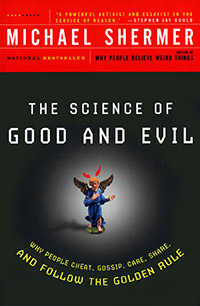Freedom tomorrow!
I recently finished Michael Shermer’s Science of Good and Evil and reviewed it on Facebook.
I have been enjoying Michael Shermer’s blog and writings in Skeptic magazine for a while now. His interviews with creationists are particularly spectactular. This book? Not so much. The title of the book should’ve been “meanderings thoughts about ethics from a libertarian agnostic.”
The Libertarian side of Shermer came to the fore in a couple of blog postings over the last few days when someone asked him how he squared his libertarianism with his self-professed status as a skeptic.
In a nutshell, I am a libertarian because conservatives are a bunch of gun-totting, Hummer-driving, hard-drinking, Bible-thumping, black-and-white-thinking, fist-pounding, shoe-stomping, morally-hypocritical blowhards, and liberals are a bunch of tree-hugging, whale-saving, hybrid-driving, sandle-wearing, bottled-water-drinking, ACLU-supporting, flip-flopping, wishy-washy, Namby Pamby bedwetters. There’s a better way. Libertarianism.
In one post he rattled off the Libertarian Manifesto and the comments were jammed with all the usual criticism of libertarian ideas but this one captured the problems just so.
Marxism is the delusion that one can run society purely on altruism and collectivism, then libertarianism is the mirror-image delusion that one can run it purely on selfishness and individualism. Society in fact requires both individualism and collectivism, both selfishness and altruism, to function. Like Marxism, libertarianism offers the fraudulent intellectual security of a complete a priori account of the political good without the effort of empirical investigation. Like Marxism, it aspires, overtly or covertly, to reduce social life to economics. And like Marxism, it has its historical myths and a genius for making its followers feel like an elect unbound by the moral rules of their society.
This quote comes from an essay in American Conservative. The quality of the essay is mixed but it has a couple of real gems – freedom as a downpayment on future freedoms.
In each of these cases, less freedom today is the price of more tomorrow. Total freedom today would just be a way of running down accumulated social capital and storing up problems for the future. So even if libertarianism is true in some ultimate sense, this does not prove that the libertarian policy choice is the right one today on any particular question.
and
Empirically, most people don’t actually want absolute freedom, which is why democracies don’t elect libertarian governments. Irony of ironies, people don’t choose absolute freedom. But this refutes libertarianism by its own premise, as libertarianism defines the good as the freely chosen, yet people do not choose it. Paradoxically, people exercise their freedom not to be libertarians.

